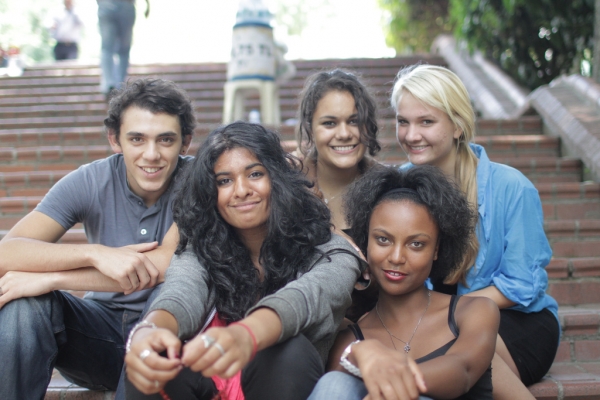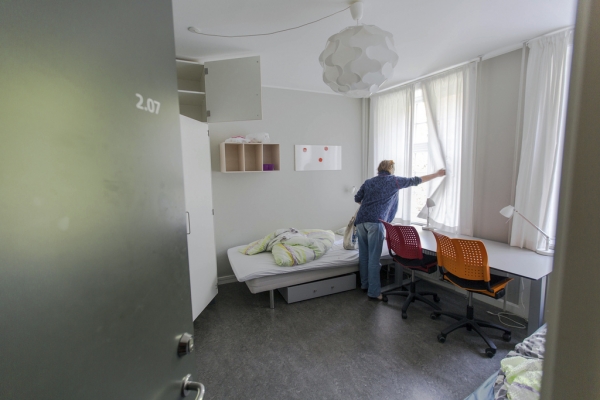Don't miss out on the best jobs!
Subscribe to HelpGoAbroad and weekly we will sent you an email with latest job posts. Provide your email address below
As you research programs to spend some time studying or volunteering abroad, you’re likely to come across the option to do a homestay. Many organizations, particularly those that run study abroad programs, use homestays as the primary type of housing for participants. Before you sign up for a semester living in a stranger’s house, though, it’s important to know what you’re getting into.
So what exactly is a homestay, anyway?
How it works
Homestays are most common in locations that have large study abroad programs, as they’re one of the most popular types of housing for students living abroad. Programs often have a dedicated homestay coordinator, who screens applications from different families and matches the families with students based on their answers to questions about lifestyle and ideal housing to ensure that both sides are as happy as possible with the arrangement.
The basic premise is that homestays provide a benefit for both parties – the student or visitor has a chance to experience daily life with a local family and has a safe place to live, while the family has an opportunity for a cultural exchange and gets a little help paying the bills. This financial aspect doesn’t mean that your hosts won’t also treat you like another member of the family, but it is important to know that your presence is an economic benefit for them. This money usually comes from the fee you pay as a participant in a study or volunteer program, and is intended to cover rent as well as offsetting the costs of utilities and food, if that is included. Many homestays, particularly those with families, do include meals for at least part of the week, so this is an important point to clarify with your family when you arrive.
Families choose to be homestay hosts for many different reasons – they may enjoy having people from different cultures around, have space now that their grown children have left the house, want to practice a new language or just see it as a relatively easy source of income. This also means that different host families have different relationships with the individuals they host, but you should never feel like your host family sees you as simply a tenant or, even worse, a free source of childcare. There are tons of great host families in the world, but there are a few not-so-great ones, so it’s important to stand up for yourself if you feel like you’re in a bad or unsafe situation.
When you arrive
First impressions are always intimidating, especially when they take place in another language, but it helps to remember that your host family may be almost as anxious to meet you, as you are to meet them! You probably have a little bit of information about each other – maybe you even managed to talk over Skype before you arrived – but meeting the people you’re going to be living with for the first time in real life is very different than a short chat.
It may be hard to communicate at first, between language barriers and coming off a flight, but it’s important to make an effort to talk with them at least a little before escaping into your room to sleep off the jet lag. First of all, it’s helpful just to go through basic introductions and learn whom everyone is, as well as to get the tour of your living space and find out about any important rules or other particularities of your new home. Plus, your family is probably excited to meet you, and might feel insulted if you immediately disappear without even touching your welcome coffee or snack.
Gifts for your homestay family
Many programs suggest bringing a small gift for your first meeting with your family (this is when it helps to know how many people are in the family and how old they are!). People often get anxious about finding the correct gift, but most of the time it’s more about the gesture than the actual object. One idea is to bring something special or representative from your hometown or country: a local candy or snack, postcards, art, decorative knickknacks or even clothing like a hat for a local sports team are all good potential gifts and help provide an icebreaker for talking about where you’re from.
Living with a family
Some host families may be hosting a student for the first time, while others might be pros with years of experience putting up with messy college students. Each family is different, so some may want to include you in every daily event and bring you along on vacations, while others may be content to have you around to chat with once in a while but nothing more. There’s no real way to know what your relationship with your host family will be like until you arrive and actually move in, but there are a few basic rules that apply, no matter what the situation.
- Treat your host family politely and with respect at all times. You may be used to a certain level of battling or casual interaction when living with your parents or roommates, but you are in many ways a guest in your homestay, so act like you would as a houseguest anywhere else.
- Communicate, even if you have to do it through hand gestures (or an interpreter). Are you sick? Planning on spending the whole night out dancing? Really, really hate onions, which seem to appear in almost every meal. Tell your family. It can be hard to discuss issues with the folks you live with, especially if you feel like you might inconvenience or insult them, but it’s better in the long run to be honest with them. They can’t read your mind, so if you need them to know something, you have to tell them (politely, of course)!
- Be considerate of the spaces you use. Maybe you prefer to live in organized chaos, but that isn’t everyone’s cup of tea, and you are technically living in someone else’s house. You might be allowed total freedom to keep your room as messy as you want – or your host mom might insist on cleaning it every week, despite your best efforts to protest. Make an effort to meet the general standards of cleanliness for your family, especially in shared spaces like kitchens or bathrooms. Though they likely won’t take you up on the offer, it never hurts to volunteer to help clean once in a while. Even if your family says no, they’ll appreciate the effort to help keep the space clean and welcoming.
Food
Depending on the nature of your or your program’s agreement with your host family, meals may be a part of your homestay experience. Eating meals with your host family can be one of the best ways to get to know them as well as to practice a new language. It’s also a firsthand introduction to some of the typical food in your new city or country – after all, there’s no better way to find out what the locals eat than by, well, eating with locals! Many homestays will have a set basic meal schedule – you might get breakfast and dinner during the week, for example, and be on your own for lunch and weekends.
If you have allergies or specific dietary restrictions (vegetarian/vegan, lactose intolerance, can’t eat gluten), this is something your host family should know, particularly if they’re providing meals for you. Most folks are willing to adapt for serious concerns like allergies, but do recognize that it may be difficult for them to change their cooking practices or menu, so be sensitive to their financial restrictions and knowledge (or lack thereof) when it comes to certain types of diets. Vegetarianism (and even more so veganism) is still relatively unfamiliar concept in some cultures, and it might take some explaining before your host family understands what you do and don’t eat. Even if it’s not true, it’s often easier to chalk these choices up to religious practices, as other people may not understand other reasons behind your decision not to eat certain foods and may even interpret it as a criticism of their cooking.
House rules
Adjusting to living under someone else’s rules can be one of the biggest challenges of a homestay, especially if you’re already used to the freedom of college dorms or your own apartment. Before signing up for a program that involves a homestay, it’s important to seriously consider whether you can deal with following rules that you may not be accustomed to or agree with (limits on visitors, curfews, playing loud music, specific times you can use the kitchen, etc.). If you already know that this will drive you crazy, then it may not be the best option for you. Of course, hosts have all different rules, and many understand that you’re an adult and treat you accordingly, trusting you to come and go as you please. Still, it’s disrespectful to ignore the rules your host family establishes, especially if they also apply to other people in the household. You may be from somewhere else, but you should not necessarily expect special treatment, and rules are often simple measures to protect your safety or that of the family – if they say they don’t want you walking home through the neighborhood at 3 am, for example, there’s probably a good reason for that, and they know it better than you do.
Like any other living situation, homestays aren’t always a cakewalk, but they’re popular for a reason – they’re one of the best ways to learn about a new culture and practice a new language (and try some new food while you’re at it)! Your homestay may not be what you imagined before arriving, and it may be very different from your normal living situation, but if you give it a chance you’re likely to find it a rewarding experience that teaches you things about your new country that you’d never learn in a classroom. Who knows, you might even learn some new things about yourself while you’re there!
Sign in to publish a comment



Be the first to comment on this post.